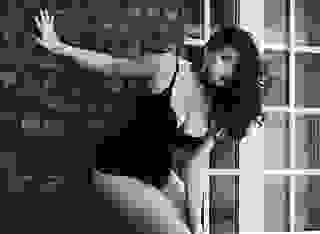- Romance
- One Shoe Gumshoe
- Page 4
Note: You can change font size, font face, and turn on dark mode by clicking the "A" icon tab in the Story Info Box.
You can temporarily switch back to a Classic Literotica® experience during our ongoing public Beta testing. Please consider leaving feedback on issues you experience or suggest improvements.
Click hereI almost asked the hotel telephonist for Marcia la Mare, having so recently read the article about her onscreen persona, but as I pressed Button A to commit my tuppence to the General Post Office coffers, I remembered in time to ask both for Mrs Mary Jones and her room number 601. With a click I was instantly connected to her room.
"Hello," she answered immediately, which threw me a little. Most of the people I call answer with the telephone number first. As a hotel guest she probably didn't know what that number was.
"Miss la Mare? It is Edgar Onslow here."
"Ah, Mr Onslow, thank yah, I've been waitin' by the phone about this time, expecting yahr call."
I reported that I had spoken to New Scotland Yard again, in more detail and had copies of their notes. I had visited Gold's last known address in the East End of London, but that everything in his room had been sold off by the landlady to pay the rent on his room, as he had not given any notice and had left some rent arrears since his disappearance.
There was no proper inventory kept, I said, but the landlady recalled it wasn't much more than a couple of changes of civilian clothes and very few personal effects. I expressed to Miss la Mare the possibility that Gold had planned to go AWOL before the weekend leave and could have gone anywhere. The landlady had now let out the room to a new tenant and she had assured me that everything that had been recovered from the room, other than his battered Bomber Command uniform, which I left there. I had checked the pockets of the uniform, which revealed nothing but balls of lint.
Miss la Mare didn't sound too upset by the theft of her husband's property, probably the fact that Gold had to travel light meant that he left nothing of much sentimental value to him in his lodgings.
While I was speaking to Miss la Mare at her hotel by phone, the pips reminded me to drop two more pennies into the slot from a pile of pennies I had placed by the phone for any additional minutes.
I informed her of my conversation with Gold's commanding officer, and his explanation that he had hardly got to know her husband due to his own recent posting to the airfield. However, I had arranged to go up by train to see him in the morning and, in the meantime, the officer had undertaken the task to try and round up any of his old crew mates for me to speak to. I told Miss la Mare that I doubted that they would be able to tell me much if anything, but it was a stone we had immediate access to that I didn't want to leave unturned.
"I wonder if it is at all possible, Mr Onslow," she asked, evenly, "if I could accompany yah to this airfield in East Anglia?"
I hesitated.
"Well," I started, but she interrupted me.
"Look, I am virtually trapped here in the hotel, Mr Onslow. A reporter from one of yah newspapers has either recognised me, or found out from an internal source, where I am staying and I am going mad just sittin' here and twiddlin' mah thumbs. I need to be out doing somethin'."
"Why would the press be stalking you? You've done nothing wrong."
"According to what this newspaper reporter told her, my maid Milly here says that they are speculating that I am over here intending to make a British propaganda movie with Brad."
"Well, it does sound like they don't know anything about your husband being missing, doesn't it?"
"No-one knows he has gone missing yet," she replied, "at least this seedy reporter seems to be expecting him to turn up here at any moment, which is why he is camped outside, camera at the ready. He is hoping for a scoop and if we are not too careful he may well sniff one out. That's what he's been askin' me over and over again whenever I have gone out, like a broken record, 'when is Brad comin'?', and how can I possibly answer him?"
"I am sure that no answer will ever satisfy the press, there's little in the papers at the moment but doom and gloom due to the Blitz and that we have been failing on the military front everywhere except the recent minor successes against the Italians in North Africa. So you coming here is probably a reporter's Godsend." I paused, while another set of pips went and I fed another tuppence in the slot. "By all means, Miss la Mare, I am happy for you to accompany me to the airfield, but I am also sure that you will find it much more tiresome and quite as boring as twiddling your thumbs in comparative comfort."
"I have never spent much time in your country before, Mr Onslow. It was quite dark when I travelled overnight by train from Wales to London. I was brought up as a country girl, so it would be nice to see what life outside of London is like."
"Of course, some underpopulated parts are almost unchanged by the war, Miss la Mare, no sandbags everywhere, or white tape criss-crossing every window, like London and the major cities. I wonder though, how the 'Fly Boys' will take it when I turn up with a famous and glamorous picture palace film star in the room?"
"I assure yah that no-one will know me as a famous anyone, Mr Onslow, they will only see me as ... yahr assistant."
"How come?"
"Well, I am hardly a mistress of disguise, but I am accustomed to playing any number of different characters, and I'm constantly assured by mah peers that I'm very convincin'."
"Mmmm," I replied doubtfully, the images of our meeting earlier sharp in my mind, how merely her presence had brightened up my dingy office like only a heavenly comet would; I couldn't honestly see how she could disguise herself as a lowly assistant to a private detective, if such a person ever existed in real life.
"Then I will see you tomorrow morning, Miss la Mare. The train leaves Liverpool Street Station at 6.45, platform 12. Er, I have already purchased a ticket for myself, though, it's only second class."
"Then I will see yah on Platform 12 at 6.45 am beside a second class carriage. Do ya know if the ticket office'll be open at that hour of the morning?"
"Yes, Miss la Mare, I stopped off as I travelled through Liverpool Street station on my way back from the Yard this afternoon, and I noticed when I obtained my own ticket that the ticket office opens at 6 am sharp. I could purchase a return ticket for you, Ma'am when I arrive."
"Yah better get used to calling me Mary then, Mr Onslow."
"Mary?"
"Mrs Mary Jones, she'll be acting as your assistant tomorrow."
"Ah, yes, your hotel alias. Should I not call you Mrs Jones rather than Mary?"
"If we were equal ranked colleagues, no doubt," she laughed, the first time I had heard her laugh, and must confess I liked it, "and if we were both men, I dare say I would call yah Onslow and ya'd call me Jones!"
I laughed at the silly formalities we have, ones that she had clearly noticed. Perhaps she would make a good detective's assistant after all?, I mused.
"Then Mary it is, Mary," I decided, "as for me, I am really not so important that you always need to call me 'Mr', when we are not in client-servant mode."
"I have no problem with our professional relationship, Edgar, we Americans are far less formal or God-damned stiff as yah Limeys are about how we address each other. I find it much preferable to be relaxed and comfortable with people I work with and it helps me to use the Christian names they were given."
Just then the pips went again. I only had a few seconds left to speak and there was really nothing else we needed to say to each other.
"Well, I'll sign off, Miss la Mare. I dare say I'll hardly know you in the morning."
"That's all right, although, of course, now I know you --"
With that, the call ended and the latest batch of pennies clattered into the telephone's coin box.
CHAPTER THREE
MRS JONES
I READ through all of Bradford Gold's letters from England to his wife in America that late afternoon and evening. They covered a period of about 17 months, about 72 weeks in all, and there were 59 letters, all of them were either two or four pages long, but mostly they said little or nothing.
There was certainly nothing of any meaning that threw light on why he would consider deserting from his commitments to the Military. He carefully avoided mentioning any airfields or even what counties he did his training or those he was posted to.
The first couple of letters, shortly after his arrival in London, were much more candid than the later ones, containing amusing accounts of his travel via Newfoundland, Ireland, a ferry across the Irish Sea and train journey onto London.
The letters rarely mentioned names, only a few nicknames, which I jotted down in my notebook to ask Miss la Mare about at some time.
All through the letters he underplayed what war work he undertook. He mentioned dropping leaflets over German cities early on, but when they switched to dropping bombs, as Bob had informed me they had, Gold simply led her to believe by omission that he was still delivering leaflets.
Even writing about the crash landing he had was made light of, though it directly led to his promotion and transfer away from bombers. Nor did he mention thinking about or actually transferring to a fighter squadron, nor referred to his move to Military Intelligence, with Special Branch, although he must have written several letters during that two or three month period when I understood he was serving with them.
At Liverpool Street station, early the next day, Thursday morning, I really didn't recognise Miss la Mare at all, in fact I doubted she had managed to get here in time for departure.
I have always been considered particularly observant by my peers but none of the three- or four-dozen people standing around me, waiting patiently for the next train to come into this platform, looked likely candidates.
There was one mousey-looking girl, too young and too short to be Miss la Mare and very plainly dressed, with no make-up and wearing spectacles. I only noticed her because she was rather fidgety, flitting about the area like a nervous bird, and exchanging pleasantries with most people around, except me. Besides, if she was my client, she'd have approached me, as I looked exactly like I usually did.
Only this time, being unsure of the rural pavements, if they even existed at all in the middle of nowhere, I had elected to carry one of my stout walking sticks.
The train, when it came, reversed into the platform, belching white steam, and the twelve carriages bumped gently to a stop at the buffers, and the guard yelled out the familiar and unnecessary phrases, "mind the doors" and later, when ready to depart, "all aboard!"
The carriages were empty, clearly just driven in from the nearby marshalling sheds, with steam leaking from below the carriages as hot water was pumped to the radiating heaters warming up the carriages from under the seats. All the carriages were dripping, the exterior having just been washed, the windows sparkling. Ideal, I thought, to see out of for someone who had never seen the English countryside in daylight before.
I had a long last look around, but could see no sign of Miss la Mare, even though I had purchased her ticket.
It had been a relatively quiet night last night, overcast with thick cloud and the ground frost free for a change, the bulk of the German bombers were probably hitting ports along the south coast or the industrial midlands, where the cloud cover affected the aim of the defending ack-ack gunners.
The air raid warning sirens, triggered by the coastal watchers, had gone off in Mile End at about eight pm, shortly after I got home, but the lack of any action brought the all-clear signal at about five-past-nine.
That meant a full night's sleep in my own bed at my digs for a change after finishing off reading the last of Gold's letters. I had slept well.
This morning, instead of the air being filled with cordite and smoking wood, everything was coated in a slippery, dark grey sooty mess brought down by the low clouds, which at some point during the night must have almost rested on the ground. It is not for nothing that London is often nicknamed "The Smoke".
I finally resigned myself to travel to the countryside north east of London alone and was about to board the empty second class carriage I had selected, when the mousey girl in spectacles that I had seen earlier squeezed past me to be first into the carriage.
"Thank you so much for holding the door open for me, kind sir," she said, in one of those Home Counties' accents from some anonymous but pretentious ladies' finishing school in Hertfordshire or Surrey somewhere; you know the type, shrill high pitched voices, all rounded vowels and overly pronounced consonants.
"You're welcome, Miss," I replied, a little annoyed, both at her and myself.
I had rather looked forward to sharing the carriage with my client and, as I had no time to find another carriage before the train moved off, was dismayed to find myself facing the prospect of sharing up to two hours with a likely vacuous teenager. I proceeded to pull myself up the couple of steps, taking most of the strain on my arms and left foot.
"Mrs," she said, as she sat down primly, about three-quarters of the way across the carriage, her small valise and gas mask resting on her lap, "not Miss," she continued somewhat haughtily.
I looked up from the doorway. She was waving her left hand at me, showing her ring finger adorned with a modest thin band of gold reflecting in the dim electric lights of interior of the carriage. I was immediately reminded of the first war, when a lot of young and too immature girls hastily married their beaux before they went off to the Front, many never to return. It almost happened to me.
I supposed that this war was no different to the previous one.
"My apologies, Madam, I didn't realise," I began dismissively. But then the little mousey girl turned on her smile and those bright, evenly spaced white teeth were unmistakably the ones I had seen in my office yesterday. Only that time they had been surrounded by ruby red lipstick, now her lips were insipid, a plain pale pink.
"You!" I exclaimed.
"Indeed, Mr Onslow ... Edgar, it is I," she grinned, still using her affected 'English' accent. "Do you know, I have walked past you four times in the last 15 minutes, and even asked the couple standing quite close enough to you for you to hear every single word —"
"For change of a shilling for a couple of sixpences for the chocolate machine," I interjected.
"Quite. And still you didn't recognise me!" She had a very superior smile on her plainly unadorned face.
"But I had your ticket."
"I know, and I pointed you out to the ticket man at the barrier that you had my ticket and I wanted to sneak up to you, and he cheerfully waved me through."
"All right, all right. You certainly fooled me," I smiled as I stretched up to put my battered brown leather briefcase into the overhead luggage rack.
"Would you mind?" she asked, holding up her valise.
I shook my head, and swung the bag up using the handles, it was very light. As I was doing so, I heard the guard's whistle again and almost immediately the train lurched forward, pushing me away from the rack. I just hung onto the luggage rack until the motion evened out before taking my seat. I had my back to the engine and she faced the way the train was proceeding.
I sat down in the middle of the bench seat, not wanting to impinge on her space. I had noted that she had scooted up to the opposite door and windows, away from the door we had entered.
This was one of those suburban carriages, with no corridor, designed for short journeys and able to accommodate a lot more seated passengers than the express trains. This was a slow train, stopping at all of the small and large stations en route. We were eventually to alight at one of the smaller connecting stations, and take a further, even smaller train on to stop at a tiny station, nothing more that a single platform halt covering a couple of hamlets and the isolated RAF airfield we were seeking.
On arrival at the halt, I was told there was a public telephone box, from which I was to ring the AOC's office, especially if we arrived earlier than timetabled or unduly delayed, otherwise a driver would be waiting for us if by any chance we were on time.
Usually punctual in peacetime, railways in wartime have to contend with the effects of the night's bombing, additional unscheduled military trains carrying ordnance, sailors or troops having priority and there may well be delays on the way caused by the upsetting of the timetables and trains not being where they were supposed to be at the beginning of each day. Some trains were subject to being commandeered by the Military without notice if deemed necessary.
I could see the reflection of her face in the dark window. It was still before dawn outside and, in the blackout beyond, there was absolutely nothing to see. Suddenly, the dim lights in the carriage went out and I could see her flinch and hear her sharp intake of breath. She may have looked serene and calm as we embarked on our journey into the unknown, but underneath it she was as apprehensive as anyone would.
"It is because of the blackout, Miss la Mare," I explained gently, "the lights are only on while we are under the platform canopy to aid passengers' ingress and egress, the guard turns them off as soon as we move off."
"Thank you, Mr Onslow, that is reassuring, but you really must remember, I am not Miss la Mare, but Mary or Mrs Jones today. If we do not stay in character, as we perfect on our journey, one may not gather the information one wants to from the airfield commander and any of Mr Gold's former aircrew."
"True, Mrs Jones, I will remember to respect your chosen role."
"Now, scoot up opposite me, Mr Onslow, I want to look out of the window as soon as it gets light and we hit the countryside. I don't want to have to keep twisting my neck around to talk to you."
I smiled, unaccustomed to have company on the job other than my usual taciturn photographer, certainly not a paying client who looked more like a girl fresh from an English secretarial college than who she really was.
So I did scoot up as requested and sat opposite her. From there I looked at her more closely. Only because I knew that the girl was Marcia la Mare, her identity was quite obvious to me, especially when she smiled her million-dollar smile.
Today, certainly at first glance, she was totally different. She wore glasses, and no discernible make-up. It made her look more natural somehow, a lot younger, less worldly-wise or sophisticated, and more approachable than the actress I conversed with only yesterday. The word 'sweet' came to mind in connection with the girl detective assistant, whilst yesterday I would have described the actress as a 'rich bitch'.
Her former ruby-red lips were no longer the focal point of her face; her spectacle-framed eyes were instead, making the most of the blueness of her irises, even in the soft dawn light coming through the clear washed glass.
She had worn a nondescript brown beret on the cold platform, but had removed it, probably while I was stowing her valise. Under her now-discarded raincoat, she had on a brown tweed skirt with a thin pale blue thread running through it, down and across in roughly one inch squares. She wore a plain white blouse, or at least what showed above a light brown v-neck woollen jumper, which looked hand-knitted, in a cable stitch I thought, which made me smile, as that was a pattern much favoured by my own mother when I was younger and wore a continuous succession of sweaters that she had lovingly knitted for me.
Mary, as I thought I better get used to calling her, wore sensible flat shoes, which was why she appeared so much shorter, and above the shoes a pair of quite thick stockings, nothing at all like the sheer ones she paraded so spectacularly in yesterday. Probably a wise choice, for the exposure to the winter elements that I fully expected at the airfield, exposed to all the elements of the East Anglia fens so close to the cold North Sea.








